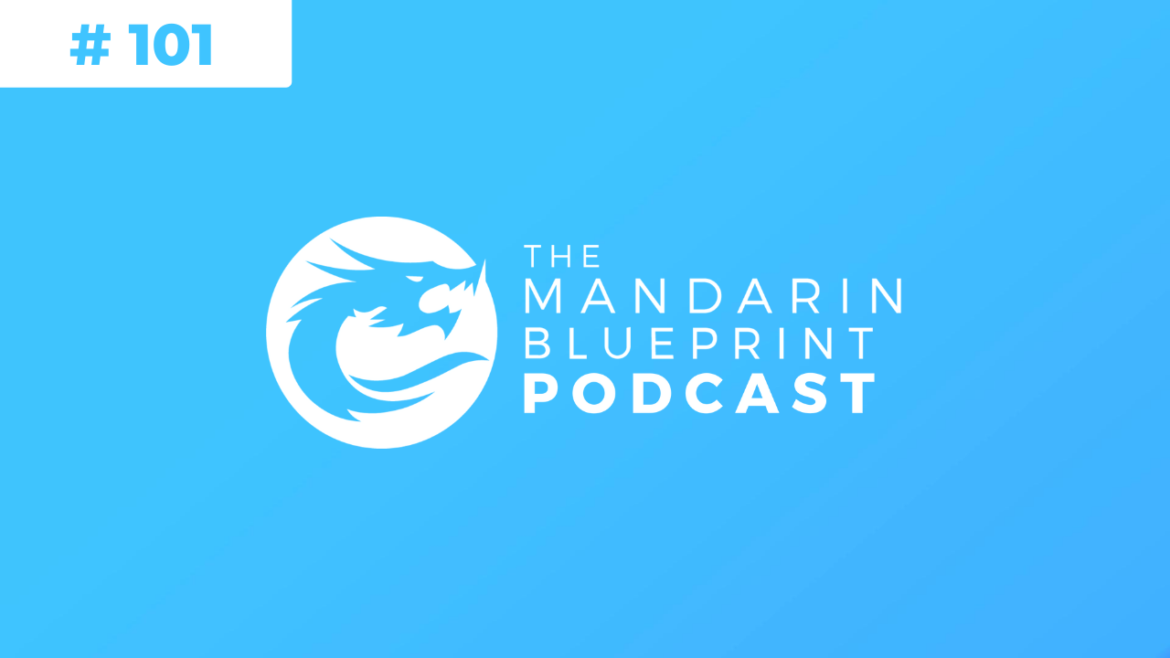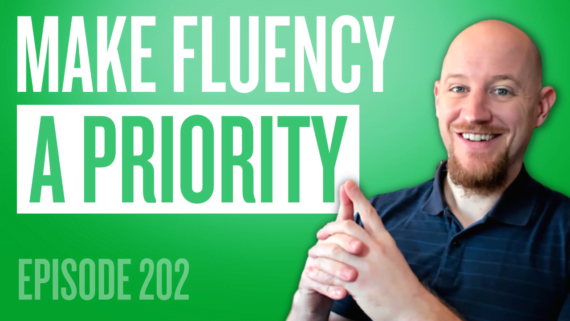
101. Expressing “only” in Mandarin with 才 cái
欢迎光临! Welcome!
You can now subscribe to the podcast by the links below, or you can subscribe by copying the following URL into your favorite podcast APP.
The Mandarin Blueprint Podcast focuses primarily on The Blueprint online curriculum. Creators Luke Neale & Phil Crimmins answer questions and comments, discuss topics related to China and Mandarin learning, and have special guests.
Want to learn how to speak fluent Chinese fast? Join our free Webinar right here.
欢迎光临! Welcome!
You can now subscribe to the podcast on iTunes, Stitcher, Spotify, or you can subscribe by copying the following URL into your favorite podcast APP:
https://www.mandarinblueprint.com/feed/podcast/
The Mandarin Blueprint Podcast focuses primarily on The Mandarin Blueprint Method online curriculum. Creators Luke Neale & Phil Crimmins answer questions and comments, discuss topics related to China and Mandarin learning, and have special guests.
0:00 Affiliate Link & Reviews
Become a Mandarin Blueprint Affiliate
Leave us a Google Business Review 🙂
0:00 GW-Connector-Only-This-Could-Make-That-连词-只有……才
When sitting down to write this post, I thought of an old American campaign to help prevent forest fires. Their mascot was a cartoon bear called “Smokey the Bear,” and his catchphrase was “Only YOU can prevent forest fires!”
What Smokey was getting at is that ‘only if’ (只有) all of us individually take responsibility, THEN (才) we can achieve the desired outcome of forest fire prevention.
When you run into this situation where there’s only one way to get what you want, using 只有…才 is the perfect structure:
只有 + Necessary Condition + 才 + Conditional Outcome
Here are some examples:
Sentence 1:
只有看这本书才能明白。 – Level 20
Zhǐyǒu kàn zhè běn shū cái néng míngbái.
Only by reading this book will you understand.
Suppose you are trying to understand something so niche that there’s only ever been one book written about it. Perhaps you want to know how the unique plumbing system in Moscow functions. Well, ONLY by meeting the condition of reading this book (只有看这本书), can you reach the outcome of being able to understand (能明白).
Note that in English, there’s no direct translation of 才, but in Chinese, it’s the separator between the condition and the outcome.
Sentence 2:
多练习口语,才会说得流利。 – Level 27
Duō liànxí kǒuyǔ, cái huì shuō de liúlì.
Only frequent speaking practice will get you to speak fluently.
As we’re sure you’re used to by now, you can sometimes omit grammar elements if the context is clear enough. Despite not adding in 只有, we can assume that “多练习口语” is the necessary condition for achieving the conditional outcome of spoken fluency. The “才” is what gives it away.
(Psst…also, if we were to be even more accurate, we’d say “Only by first getting loads of comprehensible input followed by frequent speaking practice can you speak fluently 😉 )
Sentence 3:
只有会玩儿,才会工作。 – Level 28
Zhǐyǒu huì wán er, cái huì gōngzuò.
Only if you know how to play (relax), will you know how to work.
As you can see, this sentence is a bit more rhetorical. In Sentence 1, we had an objective measure of understanding (reading the book 看这本书). Here, the speaker has more of a rhetorical flare. Depending on the opinion of the speaker, you could switch it to “只有会工作,才会玩儿 – Only if you know how to work will you know how to relax.”
Sentence 4:
父母的工作日都很忙,只有周末才能陪孩子。 – Level 28
Fùmǔ de gōngzuòrì dōu hěnmáng, zhǐyǒu zhōumò cái néng péi háizi.
Mom and dad are very busy with their job. They only have time for their child/children on weekends.
We’ll end with this cultural anecdote of a sentence. In China, it’s common for grandparents to be responsible for raising children while the parents work. Thus, the weekend (necessary condition) is the only chance for these parents to be with their kids (conditional outcome).
Lookout for 才
When reading and listening, looking out for 才 is your best bet for noticing this structure. Sure, not every usage of 才 indicates a conditional outcome, but it tends to stand out in a sentence and allow you to notice and comprehend. 加油!
7:28 Comments & Emails
Christopher Weeks by Community
Two questions today 🙂
One of the comments I keep getting from both a language exchange partner and a Chinese tutor of the ‘-e’ sound, especially when combined with the initials zh, ch or sh. I have been told I am rolling my tongue too much. Any particular tips or videos to help with this particular sound?
Also, I am definitely having trouble remembering the Conversation connectors as flashcards, and have always struggled with ‘sentence’ or ‘phrases’ being remembered in comparison to individual words. Any tips on this, or how to make some small edits to the cards to make it a little more ‘brain-friendly’.
My thanks in advance 🙂
Progress Update: I have been doing the Mandarin Blueprint Method since June 26th and am very happy with my progress so far, especially with remembering how to write characters, which has always been an issue for me. Just finished Level 15 of the Hanzi Movie Method, finished the Pronunciation Mastery back in mid-July and I think I have only skipped 2 days on Anki back in June. Hoping to hit Character 200 at the end of August, and hit the newly updated Phase 4!
15:43
Máire Liath Ní Bhrádaigh by Community
I am struggling to find time for language learning. When I started this course I worked three to four twelve-hour shifts a week. Now it is typically sixty. I am trying to cut it back down, but so many of our staff just quit over COVID and I feel guilty if I don’t help cover the shifts as our residents need us. So, I am trying to rationalize my free time and be organized to continue the course. Do you think you think a minimum of three hours a week, spread over my lighter days, will be enough for progress? That will be a minimum of an hour a day three times a week.
Before people suggest I should try to do something on my workdays, please understand that I walk to and from work, and several times when I get home from my nightshift and have managed to eat something I am so tired I cannot bring myself to get off the sofa and walk to my bed. These are not days when my brain takes in new information.
19:15
Allison Marshall on ANKI DECK(S) INSIDE – Level 6 Complete
First, this entire course is amazing, thank you for all your hard work! Second, these movies have turned into storytime with my kids! ? They want to hear all the movies I’m making up and now have the favorites they request again and again (sneaky parenting hack: they’re learning Chinese too without even realizing it…)
21:13
Ramona on Make a Movie 应
I know it’s probably not the right place to post this but…Yeah!
Pretty excited myself to have reached Character number 400!
I deserve a break and a cake now! Gotta go! 🙂 but before this, just want to say again: Thanks guys for this amazing method!!
22:01
Christine on 用什么办法可以学好汉语
Oh my goodness. So awesome to be able read and listen to this
and actually anderstand and follow. Awesome!
22:36
James Braun on ANKI DECKS INSIDE – Now Just LOOK at how SOLID that Foundation Is!
Hi guys, just want to echo so many of the comments and tell you how much I am enjoying the course. You guys seem to have hit on a perfect combination of elements that make up your course: the well-laid-out and clearly defined path to learning characters, the Hanzi Movie Method, all of the videos, podcasts, Anki decks, links and recommendations to online resources, the list go on and on. It’s like you guys have hiked to the top of the mountain and have paved the way behind you. All we have to do is follow and keep putting one foot in front of the other.
I also really appreciate the encouraging videos and emails. I know I have to put in the work, but it’s great to have you guys as my “coach.” I’m happy to report that I have taken Phil’s advice and have had no zero days since I started the course 5 months ago! Keep up the great work and I look forward to the next phase in the journey. 谢谢你们!
22:44
William Beeman on Pick a Prop 丁
The European comic character Tin Tin is evidently 丁丁 in Mandarin. Who knew?
25:13
Simoné Popadopolis on New Vocabulary Unlocked! 吓死
Interesting to see 我 the 3rd character in this phrase 吓死我了 – any
particular reason for its placement there rather than at the start?
26:22
Ric Santos on The Phase 3 Blueprint Expansions
“我早上骂了我的儿子”
This is great! I just got what the message is. I paused a moment at 骂, in a flash the horse entered my mind, but I immediately recalled the 2 angry eyes in my movie, so this is the scolding part! The rest I was easy, really.
26:59
Ric Santos on Time to Get Real About Sentences
我的马很吓人. I understood this at first look as “My horse is very scared of people.” I assumed “of” was omitted. But of course, in a follow-up conversation, this could be eventually clarified, 是不是?
I enjoyed reading the above sentences without checking its meaning, but only recalling the Hanzi Movie.
The other dopamine moment was when I got blank with the meaning
of 找. In my movie, it was a finger triggering the speargun, so the meaning of FIND ( a fish) popped out suddenly, and the tone followed because the actor was underwater. Yes, the actor was scuba-diving in my set.The Hanzi movie method is really paying off this early. Thank you
for being persistent in teaching the Hanzi Movie method, I am
appreciating it a lot more at this time.
28:05
Benjamin Rees on REQUIRED: Phase 4 Intro & ANKI Updates
I also differentiated between slow and native speeds in the album category so I could listen to all the recordings of the same speed in one go
29:01
Rayna on Nasal Final UANG (WANG): 忘 wàng,爽 shuǎng
Thanks for leaving vulgar words out of the course. I don’t curse, and I want to be able to freely recommend this course to my friends of a similar opinion. Besides which, I’m learning Chinese because my sister-in-law is from China. Her first name is 双 Shuāng because she was the second born child. Anyway, thanks for the tip so I can be sure to use the correct tone first tone when I say her name!
30:41
Jason Pon on It’s a Word! 也
Is there a grammatical difference between 还 and 也 in expressing ‘also’?
32:12
William Beeman on Make a Movie 周
Hi! Can you explain a little better the difference between 周 and 星期? Thanks!
33:42
Ric Santos on New Vocabulary Unlocked! 上来
I enjoy reading without the pinyin…but it seems that in my mind the pinyin ghosts float under the lines somehow. I look to the pinyin in my mind, ah so tempting! I try to read again consciously “reading” the characters themselves and recalling the actors and sets of the HMM. Slow but surely.
Also by writing the characters on a separate sheet, I don’t see the ghosts pinyin anymore. I think writing the characters weans me from the pinyin slowly.
35:15
Ric Santos on Make a Movie 想
At 0:38 I don’t think you are tone-deaf at all. I might actually guess you are very strict in terms of accuracy of tones ( even though there are just 5,) You, in fact, have succeeded how to make a TONAL language easily possible to learn even for many many people who have no idea what a tonal language is. This is another way of showing my appreciation for your wonderful MBP, Thank you.
36:06
Korneel Sn on MAKE A MOVIE 半
I tend to not want to put myself in the scene, but the examples given suggest that that would be a good idea?
37:16
Nacho En on New Vocabulary Unlocked! 宝宝
Hello Luke and Phil!
I have a little question, in the sentence 父母谁来决定宝宝的长相。What’s the function of 来 after 谁? Is it relevant?
41:08
Micaela Ellison on Simple Final I (YI) Quiz
First, I love the idea of tone pair anchors presented in the unit wrap-up. I definitely have those words that have stuck in my mind for whatever reason. But I’ve never thought of using them to solidify the tones of other words I’m learning. Excited to try that! Also, you say 个 is a universal measure word. Do you mean you can use it and be understood, or is it actually correct to use it in every case? I guess my real question is would a native speaker do that?
43:31
William Beeman on Make a Movie 行
Hi, I hope this exchange is not just an annoyance for you, because I do very much enjoy you guys’ insights, and I am really learning a lot. very quickly. I cited 旅行 precisely because it had to do with travel/movement. The use of 行 to mean things like “possible” “OK” and the like seems then to be kind of metaphorical–even slangy. Sort of like German “es geht” (it
goes=it’s ok, things are going along) or even English “things are going well/fine)” Thanks again for these pleasant interchanges, and for answering so immediately. I calculate you were answering my earlier query in the morning. You are really dedicated. But we’re all having fun (at least I hope you are).
46:16
Alex Sumray on Vocab Unlocked from 待
Sometimes I’m confused by these new words when it doesn’t seem
to change the definition of previously learned characters.For example;
等待.. is this just a synonym for 等 used on its own, or are there reasons to we would use one not the other?
48:24
William Beeman on Make a Movie 得
Can you explain the difference between 得 and 需要? Thanks!
Examples:
得 děi = Must
必须 bìxū = Must
必须得 bìxūděi = Must
49:40
Paul Schutz on New Vocabulary Unlocked! 人们
I’ve also done all of Pimsleur, many lessons multiple times, and am going through all of them again. I know you guys don’t like it as much as some other programs, but it is one of the most accessible ones to use while driving or working out, etc, as you can just hit play and enjoy the half-hour ride.
50:39 Movies!
This blog post explains the theory behind Movie Scenes and learning characters.
Nick Sims (戴燚)on MAKE A MOVIE 午
In my childhood bedroom it’s dusty, a little dry and drafty and Wolverine is standing there looking deeply into loser Trumps eyes as they square off. Tic-tok, tic-tok….the clocks goes until
Noon! GONG! Wolverine draws his blades ready to slice him up and
scared Trump tries to do a shadow clone move and it doesn’t work.
Trump, faints frozen.


